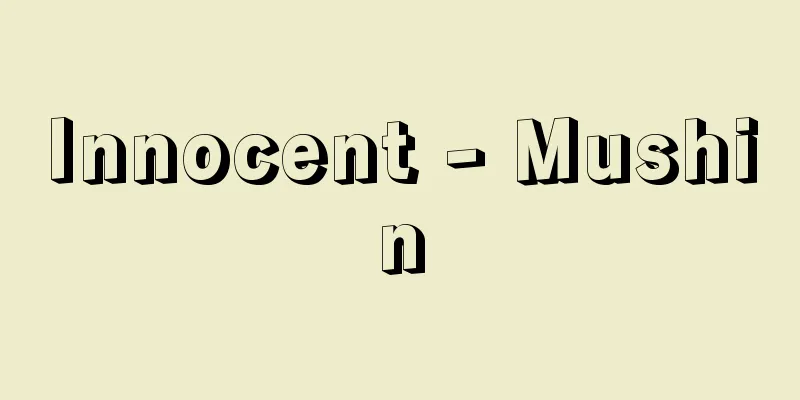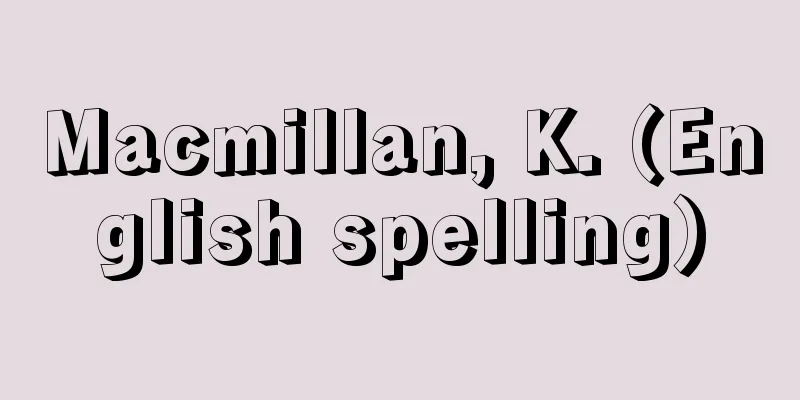Innocent - Mushin

|
〘noun〙 [1] A lack of mental activity in a certain area. A lack of heart. Lacking deep thought. ⇔Having a heart. ① (adjective-verb) Lacking discretion and common sense. Inconsiderate. Shallow-minded. Also, the state of being like that. By extension, a state of being insensitive. ※Makura (end of the 10th century) 133 "Those who say such things to Maro and the like may turn back and become cruel, and so on." ② (adjective-verb) Lacking the heart to understand emotional feelings. Also, the state of being like that. A state of being unrefined. A state of being without taste. ※Utsubo (c. 970-999) Kuniyori-jo "Masayori had many children, but <omitted> when other people were playing, he would only play the flute for cutting grass and was very cruel." ③ (adjective-verb) (also "mujin") A state of being without human feelings. A state of having no consideration for others. A state of being heartless. ※Genji (c. 1001-14), Tokonatsu: "I was thinking that she would come all the way, but she was a very dear friend of the Middle Captain, and she did not come. I must have been feeling ill."④ (━suru) To ask for something without regard for the inconvenience it may cause to others. To ask for money or other items without reservation. Also, such a request or demand. ※Teikin Orai (c. 1394-1428), "Although I wish for it without any hesitation. A curtain. The curtain is a skewer." ※Toraakirahon Kyogen: Two Daimyo (late Muromachi period - early early modern period), "There is something about you that I am complaining about." [2] The state of having nothing attached to one's mind. ① Buddhist language. A state of being free from fixed attachments. A mind free of all the delusional thoughts of an ordinary person. An empty mind. No thoughts or feelings. ⇔ Having a mind. ※Shobogenzo (1231-53), Sankai Yuishin, "The mind is like a flower that has been picked up and broken. There are those who have a mind and those who have no mind."② Buddhist term. The mind that sees everything as empty. ※Gakudo Yojinshu (c. 1234), "With Buddhism, it is impossible to have a mind . With no mind , it is impossible ."③ (adjectival verb) To be honest and without any grudges. The state of being naturally open-minded. ※Bunka Shureishū (818), Part 2, Maicho (Emperor Saga), "By itself, it is not due to the sound of the strings or the music, and the spring breeze dances without a mind." ※Kanazoshi, Mi no Kagami (1659 ), Part 1, "Without a mind of goodness or desire, it is mindless." [3] The lack of mind of inanimate objects, plants, and animals other than humans. The lack of emotion. Also, the state of being like that. Insensible. *Ryōunshū (814), a poem written at a banquet held at Shinsen'en, in the chapter on Fallen Flowers, in response to Takaoka Daigetsu: "Without heart, the grass and trees still have love, A drunken minister returns to his life, and his kindness is in danger ." [4] In literature, especially in verse, both the poetic ideas and the expressions are humorous and vulgar. ⇔Ushin. ① Refers to kyōka, a type of poetry, as opposed to ordinary waka, which aims for elegance. Kurimoto. *Igaerō (c. 1362-64), 6: "Kakimoto calls his usual poems ushin. Kurimoto calls his kyōka, which he calls mushin." ② Refers to renga that is humorous and commonplace, as opposed to ushin renga, which is based on the traditions of waka. Mushin renga. Also, the people of mushin renga. ※Yakumo Gosho (around 1242) 1. "Long ago, Mushin composed a linked poem called 'Su ni sashite koso', and Ushin added 'Aha bigahi'." Source: The Selected Edition of the Japanese Language Dictionary About the Selected Edition of the Japanese Language Dictionary Information |
|
〘名〙[一] ある方面についての心の働きが欠けていること。心のいたらないこと。深く思う心のないこと。⇔有心。① (形動) 思慮分別のないこと。気のきかないこと。心のあさはかなこと。また、そのさま。転じて、無神経なさま。※枕(10C終)一三三「まろなどに、さることいはむ人、かへりてむしんならんかし、などのたまふ」② (形動) 情趣を解する心のないこと。また、そのさま。無風流なさま。無趣味なさま。※宇津保(970‐999頃)国譲上「正頼、子供あまた持て侍れど〈略〉人の遊びせむ所には、草刈笛吹くばかりの心どもにて、いとむしんにて侍り」③ (形動)(「むじん」とも) 人情のないさま。他に対する思いやりのないさま。無情なさま。※源氏(1001‐14頃)常夏「いとかけり来まほしげに思へるを、中将のいとしほふの人にて、ゐて来ぬ、むしむなめりかし」④ (━する) 他人の迷惑をもかえりみないで頼むこと。遠慮なく金品などをねだること。また、そのような依頼、請求。※庭訓往来(1394‐1428頃)「雖為無心所望。幔幕。同幕串」※虎明本狂言・二人大名(室町末‐近世初)「そちにむしんをいひたひ事が有が」[二] 心中に何もとらわれた心がないこと。① 仏語。固定的なとらわれがなくなった状態。凡夫の一切の妄念がとりはらわれた心。虚心。無念無想。⇔有心。※正法眼蔵(1231‐53)三界唯心「心これ拈華破顔なり。有心あり、無心あり」② 仏語。一切は空であると観ずる心。※学道用心集(1234頃)「仏法以二有心一不レ可レ得。以二無心一不レ可レ得」③ (形動) 心に何のわだかまりもなく素直であること。自然のままに虚心であるさま。※文華秀麗集(818)下・舞蝶〈嵯峨天皇〉「本自不因絃管響、無心処処舞春風」※仮名草子・身の鏡(1659)上「善の心もなく欲の心もなく無心(ムシン)なり」[三] 無生物や植物、人間以外の動物などが、心をもたないこと。情意がないこと。また、そのさま。非情。※凌雲集(814)於神泉苑侍宴賦落花篇、応製〈高丘第越〉「無心草木猶余恋、况復微臣酔二恩危一」[四] 文芸、特に韻文において、詩想、表現ともに滑稽、卑俗をねらいとするもの。⇔有心。① 優雅を旨とする普通の和歌に対して狂歌をいう。栗の本。※井蛙抄(1362‐64頃)六「柿本はよのつねの歌、是を有心と名づく。栗本は狂歌、これを無心といふ」② 和歌の伝統の上に立つ連歌を有心連歌と称するのに対して、通俗的なおかしさの強い連歌をいう。無心連歌。また、無心連歌の人々。※八雲御抄(1242頃)一「昔無心が『すにさしてこそ』といふ連歌をしたりしに、有心の中より『あはびがひ』と付たりき」
出典 精選版 日本国語大辞典精選版 日本国語大辞典について 情報 |
>>: Niotha livescens - Niotha livescens
Recommend
South Pacific Forum - International Forum for Pacific Islanders
South Pacific Forum. A summit of independent natio...
Helsinki - Helsinki (English spelling)
The capital of Finland. Population: 559,718 (2001...
Aerial cable car
…It is also called an aerial cableway or an aeria...
Okiage doll - Okiage doll
...One theory is that the name comes from the fac...
Okinamai - Dance of the Old Man
〘Noun〙 In Noh, the shite of the "Okina" ...
Decriminalization
Decriminalizing acts that were previously consider...
Anatini
…The genus Tachyeres is also a close relative. (2...
University of Salerno - University of Salerno
One of the oldest medieval universities in Salern...
Noriyuki Takakura - Noriyuki Takakura
1130-1205 (Oji 5-Motokyu 2) He was a trusted vassa...
《Infinite Progress》
... Her debut work was the first film adaptation ...
Nonlocal field theory
Quantum field theory has been extended to give ele...
Disaster Countermeasures Basic Act
This law aims to promote comprehensive and system...
Mont Pelvoux (mountain)
It is part of the crystalline massif of the northe...
Idria columnaris (English spelling)
...These are completely different plant groups in...
Ukimono Aya
… The changes in the production system and the ri...









